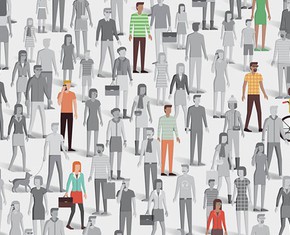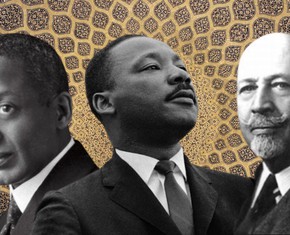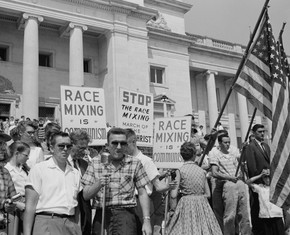The views expressed in our content reflect individual perspectives and do not represent the authoritative views of the Baha'i Faith.
Disturbed and distraught, I really despaired for my country after I saw a recent advertisement for a back-to-school sale at a popular chain department store promoting bulletproof backpacks for kids.
You simply have to question the state of your society when bulletproof backpacks become a thing.
Lately we’ve all asked ourselves this awful question: what causes these mass shootings, where mostly young white men randomly slaughter large numbers of children and adults they don’t even know? In America today, that haunting thought plagues us.
In fact, for years now, researchers, sociologists, scholars, pundits and philosophers have tried to unearth the reasons why the United States has so many mass killings, and every other nation has so few. They’ve variously blamed it on video games, mental illness, the guns themselves and many other potential causes. But other countries have video games and mental illness, and they don’t have the homegrown terror the United States does. Yes, the United States’ population owns more lethal weapons than any other nation—Americans possess an estimated 44% of the world’s guns in their personal arsenals—but does that fully explain the problem?
It’s certainly an important part of the equation—as is racial hatred. Not all mass killers have racist motives, but many do. The Baha’i teachings warned America more than a hundred years ago that we must remedy our country’s longstanding curse of racism, pointing out that it has caused:
… a situation which, if allowed to drift, will, in the words of Abdu’l-Baha, cause the streets of American cities to run with blood … – Shoghi Effendi, Citadel of Faith, p. 126.
Unquestionably, these multivariate factors all have significant impacts on our mass killing epidemic. But I’d like to suggest, with the help of insights gleaned from the Baha’i teachings, another important contributing factor to mass killings that we don’t much discuss, our culture rarely questions, and therefore we haven’t really sufficiently considered—war.
During the lead-up to the first World War in 1914, Abdu’l-Baha spoke about the ultimate effects of waging war in a conversation with the German consul to Palestine, Baha’u’llah’s final place of exile. Trying to talk the consul and his country out of going to war, Abdu’l-Baha said:
From the beginning of history to the present time, what has been the profit that humanity has gathered from war? Nothing but ruin, devastation, the desecration of the holy rights of man, vandalism, carnage and the brutalization of the ideals deposited by God in the hearts of men. And if we read the spirit of modern history aright, we come to the conclusion that there is no war of conquest—the conqueror and the conquered find themselves in manifest loss at the end of the engagement. – Star of the West, Volume 4, p. 180.
War certainly does brutalize the ideals “in the hearts of men,” and the post-war periods in many, many countries have amply demonstrated that reality. The United States has now been engaged in continuous war, in Afghanistan, Iraq and several other places in the world, for the longest period in its history—long enough to witness the coming-of-age of an entire generation. Young Americans just becoming adults today have never known a time when their country was not at war. During those prolonged wars, the country has also slowly and painfully tried to come to grips with its first wartime defeat in Vietnam.
As a result, Americans now exist in a heavily militarized, warlike environment. That environment has exported mass violence, created the false ideal of every soldier as a hero, and suffered when traumatized soldiers who have had their ideals brutalized return home. All of these impacts of state-sponsored violence and mass murder have a profound effect on our collective consciousness. We begin to accept war as normal. We valorize violence. We call all soldiers heroic. We thank veterans “for their service,” even when that service meant murdering civilians. We allow hatred to fester, and the groups that promote it to grow. We see others as our enemies rather than our fellow human beings.
Have you noticed that many mass murderers, especially when it comes to the random, racist shootings so common in America today, dress up in military garb before they act out their attacks? Certainly you’ve seen that most of the so-called “active shooters” use military-style weaponry to do their killing. (Why do we call them “active shooters, anyway—are there any passive shooters?) Without question, many of the mass murderers we’ve witnessed have a death-centered fixation about the purportedly heroic defenders of the nation mowing down our supposed “enemies”—their manifestos and social media posts prove it.
I’m not equating the soldiers who fight wars with the terrorists who perpetrate mass killings—but both do cause carnage and death in large-scale ways, so some parallels exist. Bizarrely, we condemn and pillory the murderers, but we treat soldiers who kill many, many people as heroes:
If a man kills another, no matter what the cause may be, he is pronounced a murderer, imprisoned or executed; but the brutal oppressor who has slain one hundred thousand is idolized as a hero, conqueror or military genius. – Abdu’l-Baha, The Promulgation of Universal Peace, p. 119.
… human ferocity proceeds from selfishness, greed and oppression. It springs from no natural necessity. Man needlessly kills a thousand fellow creatures, becomes a hero and is glorified through centuries of posterity. A great city is destroyed in one day by a commanding general. How ignorant, how inconsistent is humankind! If a man slays another man, we brand him as a murderer and criminal and sentence him to capital punishment, but if he kills one hundred thousand men, he is a military genius, a great celebrity, a Napoleon idolized by his nation. If a man steals one dollar, he is called a thief and put into prison; if he rapes and pillages an innocent country by military invasion, he is crowned a hero. How ignorant is humankind! Ferocity does not belong to the kingdom of man. It is the province of man to confer life, not death. – Ibid., p. 103.
So why do so many young American men adopt the pose of the soldier and kill people randomly?
Perhaps, the Baha’i teachings suggest, we might find part of the answer in Abdu’l-Baha’s trenchant observations on what prejudice, hatred, the glorification of war and military killing do to the cultures that accept and adopt them.
Those incisive observations may explain why so many mass murderers dress in battle gear, use military weapons and play out their bloody fantasies of the avenging, heroic soldier on their unsuspecting innocent victims. Certainly our massive “defense” budgets reflect America’s preoccupation with the use of deadly force to address humanity’s issues—so maybe, just maybe, our exportation of violence to other parts of the world has now come home to roost.
So what’s the solution? The Baha’i teachings say:
We must all believe in all the prophets. We must all acknowledge the divine authority of all the heavenly books. We must wash our hearts free of all human prejudices. We must serve God. We must propagate the oneness of the realm of humanity. We must be the cause of the appearance of the perfections in the world of man. We must not be like the beasts of prey. We must not allow carnage and bloodshed. We must regard the blood of men as sacred. We must not shed the holy blood of man for the paltry earth. We must all agree upon one fundamental principle. That principle is the oneness of the kingdom of humanity. …
We must supplicate God that He may confirm and assist us to become the embodiment of the perfections of man; not to extinguish the torch lighted by the Hand of Majesty; not to stop the down-pouring of the Rain of Mercy; not to cut His green and verdant trees; not to prevent the descent of heavenly blessings, but to become confirmed in such wise as to adorn the realm of humanity, to illumine the East and the West, to create means of the interdependence of man, to destroy the basis of war and to become the cause of the affiliation of the hearts.
This is our hope! This is our utmost aspiration! – Abdu’l-Baha, Star of the West, Volume 2, pp. 4-5.
















Comments
Sign in or create an account
Continue with Googleor